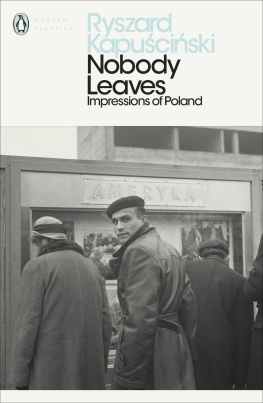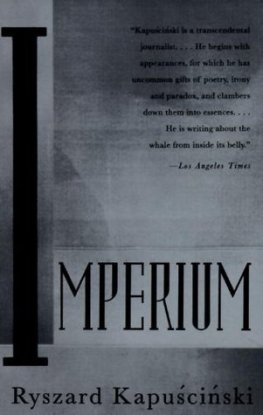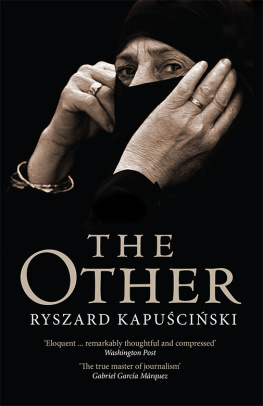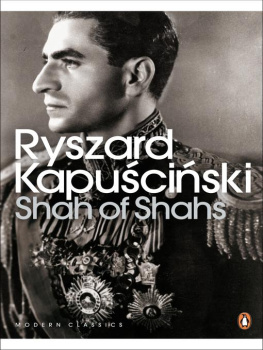Ryszard Kapuciski
Nobody Leaves
Impressions of Poland
Translated by William R. Brand
Translators Note
In 1959, when he turned twenty-seven, Ryszard Kapuciski had already been abroad as a reporter. In that year, he went to work for the weekly Polityka, which sent him into the field as a domestic correspondent between brief assignments in Africa. His stories appeared at irregular intervals, often on the front page. In annual polls, the papers readers picked Kapuciski as their favourite writer on a staff filled with journalists who would dominate the Polish media over the following decades.
The Poland that Kapuciski was reporting on was, from our perspective today, as exotic as any of the Third World countries he covered. He liked to point out its similarities to new states throwing off colonialism or struggling through major social conflicts. Poland had suffered destruction and Nazi occupation in the Second World War less than two decades earlier, and was still rebuilding. Compromises between Roosevelt, Churchill and Stalin led to the imposition of communist rule. The countrys borders shifted Kapuciskis own birthplace ended up in the Soviet Union, while Poland absorbed territory that had long been German.
Polish Stalinism ended with the thaw of 1956. A new leadership released political prisoners, eased censorship, and won fleeting popularity with gestures of assertiveness towards the Soviet overlords. People had barely begun exploring this lessening of restrictions when the Party started tightening the screws again, leading by the time these pieces were written to a minor stabilization that attempted to compensate for diminished freedom with modest improvements to the standard of living.
Most Poles hated this alien system they were fated to live under and did not hesitate to say so in private. But such views could hardly be expressed in public, let alone in the press.
The official narrative never deviated from Soviet-style orthodoxy. Its themes were outside threats (in particular German revanchism American-backed West Germany was now a NATO warmonger with a shameful Nazi past, and worst of all it refused to recognize the transfer of German territory to Poland), progress (Sputnik of course, but also domestically produced automobiles or at least motorbikes, and the electrification of the poverty-stricken countryside), and the topic that never went out of style, industrialization and the benefits it supposedly brought to the populace.
The ruling party claimed that history was on its side, and the country would prosper if only everyone joined the collective effort under its stewardship. There were holdouts, but they were denounced as a Catholic, nationalistic element that would fade away as successive waves of young people came on the scene and joined in constructing a bright future.
How did Kapuciski, an emerging star reporter for one of the regimes leading opinion-shaping organs, write about this Poland?
He turned almost everything on its head. He sought out people who had been bypassed by the new order, or who refused to join in.
Instead of writing about the new factories and housing developments, he journeyed to remote parts of the country, to run-down villages that had been practically medieval a few years earlier or towns taken over from the expelled Germans. In The Fifth Column on the March he discovers an elderly German mother and daughter stranded since the end of the war in a Polish old peoples home. When they happen to catch a West German broadcast on the radio, they believe that the Reich has risen again and set out to reclaim their confiscated property. This is a burlesque of official propaganda about resurgent German militarism.
A Farmer at Grunwald Field recounts a visit to the site of the 1410 Battle of Grunwald, a victory by the Polish Commonwealth over the Teutonic Knights and the occasion for an annual propaganda extravaganza. The farmer Kapuciski talks to does not know or care what all the fuss is about. He is concerned about his crops.
Penurious university lecturers riding a train to the lake country in A Survivor on a Raft glance uneasily out of the window at private cars and motorbikes carrying the more fortunate beneficiaries of the Minor Stabilization.
On the Ground Floor does have to do with the industrial boom but only in the sense that its vagabond characters scorn the game everyone else seems to be playing. The university dropouts of No Known Address represent another variation on abnegation as a chosen lifestyle. The protagonist of The Geezer, once an enthusiastic activist, is burned out after all the political shifts of the past decade, and the title character of The Loser renounces consumerist ambitions and retreats into a kind of proto-beatnik serenity. Nobody Leaves and The Taking of Elbieta depict existential hells that no ideology or ruling party could ever alleviate.
How did he get away with focusing on individual dilemmas and alienation so at odds with the Partys image of the society it claimed to be building? Kapuciski was far from being any kind of dissident. He was doing his job. Reporters under communism were not expected to be mere stenographers recapitulating Party edicts. Nor were they supposed to be objective if that meant ignoring potential causes of public discontent. In her 1990 study Polands Journalists: Professionalism and Politics, researched before the fall of the old system, the American sociologist Jane Leftwich Curry notes that the press was something like a British loyal opposition , a watchdog to ensure that policy was implemented properly. Moreover, she writes, it was normal for journalists to have connections among the ruling apparatus, and to use those contacts to influence policy.
Thus it is that in The Dune, when the collective farm faces bankruptcy, the reporter/narrator steps in with an offer to finagle the money out of the county administration. In Danka, he parodies a semi-literate policeman and a bombastic local Party boss who are incapable of dealing with an outbreak of faith-based violence.
Kapuciskis main focus, however, is not on himself or his role. These are stories about the people he encounters. He sometimes pokes fun at their foibles, but never withholds his empathy. The way many of them have deliberately cut themselves off from the big worlds of ideology and consumerism accentuates their humanity. Some of them are trapped. Most of them, however, have or had a chance to shape their own fate, to make something of themselves. Many have squandered that chance, or never even noticed it when it came along. They become spectators, extras, losers, outsiders who will never rise above the ground floor. These are existential moments caught in a philosophical spotlight.
The discus-thrower in The Big Throw knows how to seize his chance. The pallbearers in The Stiff manage to form a functional collective, but only because there is no other way out, not as a response to directives from above.
Beyond these stories of individual choice, Kapuciski revels in his descriptive abilities, his ear for speech, and the earthiness of the country he is reporting on. City people dont know that you can sniff the soil. And it had a smell. Soir de Paris. His villagers might have terrible taste or an aversion to toothpaste, but there is something exuberant about the way they buzz around their fields on motorbikes, show off their wristwatches, or board the new Torpedo train. Here, at least, Kapuciski discerns the progress made since his own grim boyhood. He can see through the eyes of his subjects and feel how their own lives feel to them. Immersing himself in the back corners of his homeland, he absorbs details of how things work and grow and also how they fail and die. Yet even when he describes the prolonged funeral cortge of The Stiff, the accent falls on life, with the mourners imaginatively reconstructing the mental life and sense impressions of a young man they never knew.









